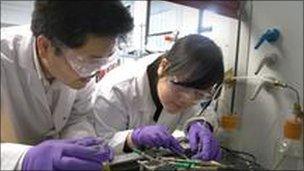Urine could be used as renewable energy source
- Published

The scientists were given a £130,000 grant to develop the project
A research team at Heriot-Watt University is investigating whether urine could be used as a source of renewable energy.
The scientists have developed a system to test whether it can be used in fuel cells as an alternative to flammable hydrogen or toxic methanol.
It could offer a non-toxic, low-cost, easily transportable alternative.
Dr Shanwen Tao and his research partner, Dr Rong Lan, have been awarded a £130,000 grant to develop it.
The work has concentrated on urea, or carbamide, a mass-manufactured fertiliser and major component in human and animal urine.
Urea solution is already used in heavy goods vehicles to reduce harmful emissions.
The academics see a future for the fuel cells in submarines, the military and power generation in remote areas such as deserts and islands.
It could also be used to reprocess waste water, with electricity as a by-product.
Dr Tao said: "Growing up in rural eastern China I was aware of the use of urea as an agricultural fertiliser. When I became a chemist and was looking at fuel cell development, I thought of using it in the process.
"We are only at prototype stage at present, but if this renewable material can be used as a commercially viable and environmentally-friendly energy source, then we will be absolutely delighted, and many people around the world will benefit."
- Published17 August 2010